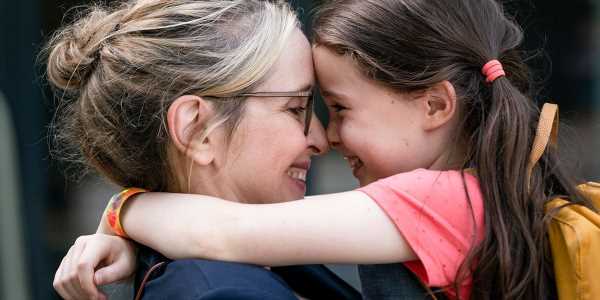Neatly and purposely divided into three acts — a black screen signals the lag time between each, should the viewer not be ready for the required understanding that things are about to change, and that it’s best to prepare now — Julie Delpy’s fascinating “My Zoe” uses its classic formal structure to tell a thoroughly modern tale. While Delpy’s directorial output thus far has mostly consisted of fizzy rom-coms like her “Two Days” features and the odd historical drama (“The Countess”), “My Zoe” finds the filmmaker and star moving fast into fresh territory. One part domestic drama, one part medical mystery, “My Zoe” subtly spins those two acts into its final segment: a contemporary thriller with morals and medicine on its mind.
First, though, there’s Delpy’s Isabelle and the eponymous Zoe, her apple-cheeked daughter (Sophia Ally, putting on a remarkably unfussy performance for a screen newbie and a kid to boot). Isabelle and Zoe’s dad, James (Richard Armitage), are in the final throes of their divorce, with Zoe’s custody arrangement the last box to check off. Despite telling the film firmly from Isabelle’s vantage point (there’s little question that the “my” in its title is entirely for her, not James), Delpy the writer and director doesn’t take sides, while Delpy the actress is firmly dedicated to getting Isabelle what she’s owed, by any means necessary.
What Isabelle is owed — or, what she thinks she’s owed — is simple: Zoe. Unhappy with James’ approach to parenting and righteously angry about a custody agreement that doesn’t give her much wiggle room (Isabelle, a doctor who moved to Berlin to accommodate her then-husband’s career, is occasionally called away for work travel; James doesn’t want to “reimburse” her for any time she might miss with Zoe, should she be out of town during her assigned custody days). They both have a point, but they’ve been circling over them for so long, neither has an inch left of give left in them.
Eventually, Delpy’s smart script reveals the source of their marital discord, a revelation that seems to tip the scales more firmly in the favor of one half of the ex-couple. Then, of course, she twists back on it, again digging into thorny moral arguments that don’t really give anyone that much high ground. What’s clear, however, is that both Isabelle and James love Zoe.
It’s perhaps unfortunate that formal descriptions of the film’s plot must be divulged to move forward into its winding narrative (in the TIFF program guide, a life-changing “tragedy” is obliquely mentioned), but knowing that Delpy is driving toward something shocking does allow the audience to appreciate the tension that begins to permeate the film’s first act. Delpy pulls the string ever tighter, and she’s laid out enough hints in just the film’s first twenty minutes that the inevitable act could be one of many.
What happens — and that won’t be spoiled here — pushes the film into a second act that functions as a medical drama, complete with mysteries to uncover and enough expository shouting to keep James and Isabelle hating each other for decades to come (and more than enough for audiences to chew on for the rest of the film). As Delpy pushes “My Zoe” further and further away from her usual directorial conventions and expectations, she allows the space for audiences to believe (or at least engage with) the nutty jump that marks it third act.
While the film is never given a precise period in history, there are hints throughout that it takes place a few years into the future, with Isabelle often turning to a slightly advanced technology for ordinary use. (Her cell phone is a bit too slick, her laptop screen is no everyday MacBook.) Those prop choices are one of many subtle touches Delpy layers on, unfussy and trusting of her audience to pay attention to the hints she’s dropping.
Which is not to say that the ultimate twist of the third act is as cleverly telegraphed, with Isabelle turning to a medical acquaintance (her frequent co-star Daniel Bruhl) and his practical wife (Gemma Arterton, underused) for assistance with an idea that could right the tragedy that just marred the second act. While Isabelle’s motivations make sense, Bruhl’s doctor is much more muddled, and the film’s big shock requires him to make a choice that, mere seconds earlier in the film, he was not even remotely prepared to make.
Yet Delpy’s ability to believe in both her audience and her wild story remains compelling throughout the film, even as it careens through tropes and tricks and genres with increasingly off-kilter speed. It may not stick the landing, but by the time the screen goes black one final time, Delpy has left enough to think about for another three acts.
Grade: B
“My Zoe” premiered at the 2019 Toronto International Film Festival. It is currently seeking distribution.
Source: Read Full Article
